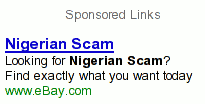Various outlets have reported on the recent appearance of evangelical spam—unsolicited bulk email which promotes religious messages instead of advertising products. It’s been pointed out that since CAN-SPAM refers to commercial mail it can’t be used to stop people who bombard you with other types of messages.
I’ve seen 419 scams with religious trappings for months. These are the usual “Help me smuggle $20 million out of my country” ploys with the added twist of “Oh, I’m a missionary” or “I’ll donate it to an orphanage” or “You can trust me, I’m a Christian,” usually tied to a middle-eastern nation where Christians are in the minority (because Nigeria is so passé). Of course the only thing the scammers really worship is the almighty X-MILLION US DOLLARS. It’s a cheap sympathy ploy, nothing more, made obvious by the fact that, well, it’s a scam!
Today I saw a new variation on that tactic: instead of appealing to Christians, this one was appealing to Muslims. It was all about some Muslim convert in Cuba who had been abandoned by his Catholic family and just needed to transfer $12 million out of the country… all sent from a UK-based email account.
On a side note, I’ve found myself wondering lately why so many of these seem to come from European ISP Tiscali, particularly Tiscali UK. (One came through yesterday with 119 copies of the standard footer!) I assume they must provide easy-to-get email accounts, or perhaps connectivity for a lot of Internet cafés. It also suggests that quite a few of these scammers aren’t anywhere near the (mostly) third-world nations where they claim to live.
